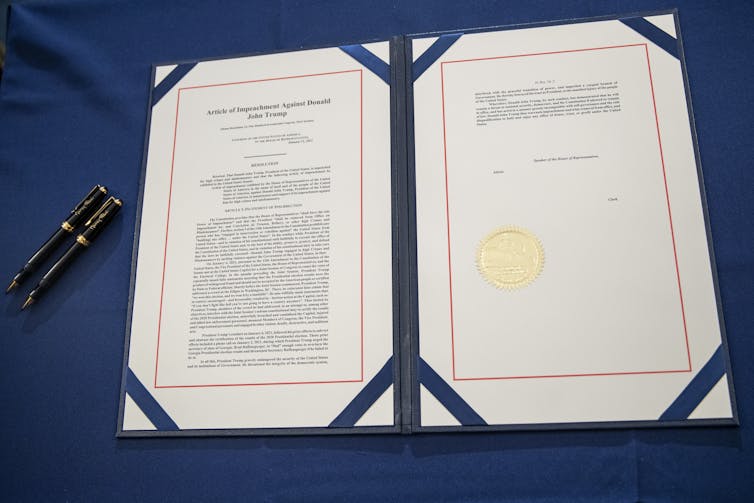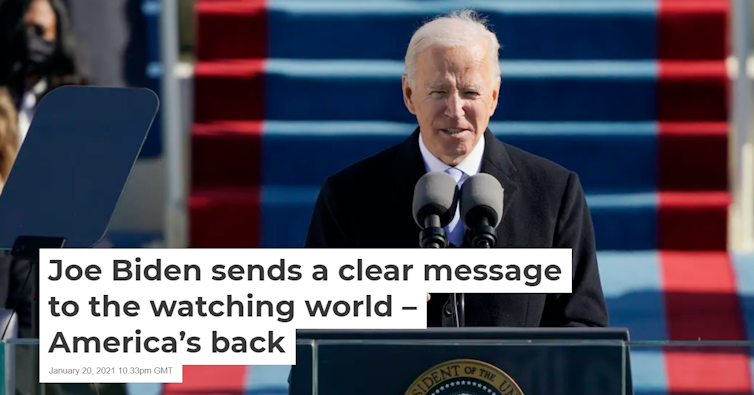Will American Politics Be Normal Again
The election of Joe Biden as the 46th president of the United States was received beyond much of the earth with a mixture of relief and exuberance, though often laced with apprehension. A mutual theme in news headlines and Twitter feeds was that normal service was existence resumed in the The states and in international diplomacy.
In France, the paper Le Monde ran with the headline: "American Elections 2020: Joe Biden's victory sparks huge relief in Europe." On Twitter, Paris' mayor, Anne Hidalgo, tweeted out: "Welcome Back, America." In Deutschland, the cover of the news magazine Der Spiegel depicted Biden putting the severed caput of the Statue of Liberty back on the torso (referencing an infamous encompass from 2017 that depicted Trump severing the head). The image is accompanied with the ironic text "Brand America Great Over again."
The theme of an American restoration was repeated in news and social media across the world. The symbolism is potent, but it is less clear what is being restored. In this information technology echoes the "return to normalcy" theme in Biden's election entrada in the The states, a cornball nostrum that vaguely promises a reset of American principles and policies. What is at outcome in these desires to get back to a pre-Trump America?
In the US, the desire for normalcy surrounding the election of Biden reflects an existential anxiety – that Trump ignited a devastating set on on liberal republic that may prove epochal.
The contradictions and tensions in American liberal democracy have been forcefully revealed with his presidency, which took advantage of the gap between declared liberal values and political reality. Trump non only exploited that gap, he spoke to latent desires and emboldened expressions of identity in both politics and people that had long been marginalised or silenced.
With Trump's ousting, the liberal desire for a return to normality has been amped up via the figure of Joe Biden. Information technology was clearly articulated by the new president at his inauguration, in his pleas for national unity and his promise to end the "uncivil war" in the US. David Sanger, in the New York Times, noted that: "Mr Biden's inauguration was notable for its normalcy, the sense of relief that permeated the upper-case letter over an era of abiding turmoil and falsehood ending."
Simply in that location was little that was normal in the scene of a scaled-down inauguration taking place with only a handful of socially distant, masked participants and surrounded past the militarised mural of a postal service-riot Capitol. The image was not of national healing but of a national emergency.

Accompanying the desire for normalcy and sense of relief is the implication that the "Trump era" was an aberration, a temporary deviation in the natural political order of things.
This is an attractive and tempting palliative for those who resisted Trump's spell and disavow the significance of his political rise and appeal to millions of Americans. In this view, Trump was "the cat in the lid" – an unwelcome company and unruly avatar of instincts for disorder, evicted one time the parents render. Enter Joe Biden and Kamala Harris.
Only Trump (and Trumpism) was and is something more than a temporary eruption in the lodge of things or mere symptom of a malaise in American public life. Trump unleashed the libidinal forces of "illiberal democracy", undermining America's commitment to constitutionalism, the rule of law and individual rights. He supported these forces in the US and encouraged them elsewhere, transforming the landscapes of American political civilisation and foreign affairs in ways we are nonetheless trying to understand.
American myopia
Americans pay picayune mind to external perspectives on their state and by and large do not reply well to critical views of it or of their leaders. That may be viewed as stubbornly patriotic, but it is more fundamentally due to a deep-seated ignorance founded on a myth of national exceptionalism, a myopia that is quintessentially American.
Trump's presidency should remind Americans of the fragility of the social and political order that so many take for granted. Is it non a piffling shocking that Americans should need to be reminded of this? Mayhap not, peradventure the amnesia is a component of the American worldview, which commonly displaces the most serious challenges to democracy on to others elsewhere.
As the American writer Tom Wolfe once quipped, the "dark dark of fascism is always descending in the U.s.a. and all the same lands merely in Europe." Of grade, "information technology can't happen hither".

Might it be that the importance of Trump's election and presidency has been better or at least more readily understood in other countries where at that place is a living memory of the pains of populist authoritarianism, where people are more than familiar with how reality can be dismantled?
The Slovenian-American writer Aleksandar Hemon suggests as much when, in the wake of Trump'south election, he commented:
In America, a comfortable entitlement blunts and deactivates imagination – information technology is hard to imagine that this American life is not the just life possible, that in that location could exist any reason to undo it.
Hemon filters his perspective through his experiences and insights from living in Sarajevo during the Bosnian war "through a time when what cannot maybe happen begins to happen, rapidly and everywhere". Observing the disorienting touch on of the early on days of Trump's presidency, he wryly notes that: "'Reality' has finally earned its quotation marks."
Reality did indeed earn its quotation marks in "Trump's America", a fantasy world in which Trump supporters imaginatively and emotionally invest. It'southward a world in which conspiracy theory and social media combine to create an culling reality, a earth that is self-contained and self-reinforcing – and impervious to facts.
Galvanised by Trump's almost messianic leadership, the fantasy has go pervasive and is deeply embedded in the imaginations – the fears and desires – of millions of Americans. It cannot just or swiftly exist undone.
Back to reality
"America is back, ready to pb the globe, not retreat from it", Biden stated in November as he introduced his foreign policy team. The "America is dorsum" refrain has been repeated ad nauseum by Biden'southward surrogates in the past few months.
What it means in terms of policy remains unclear. More symbolically, it is declared as a rebuttal of Trumpist strange policy, infamously sloganed as "America Starting time", suggesting a renewed era of United states of america global engagement and leadership. Simply the pregnant remains open and opaque and, as Julian Borger observes in The Guardian: "How a slogan as all-encompassing every bit 'America is Back' is received around the globe will inevitably be a Rorschach test for what is perceived to be the 'real America' that has been absent in the past iv years."

The perception of what constitutes the "existent America" is both a domestic and foreign policy dilemma for the United states. Assumptions about liberal democracy at home and about a liberal world club abroad are no longer acts of faith.
As we caput into a "post-American earth", global enthusiasm for democracy cannot be assumed, nor can the ability of the The states to set up an example, for that has been undone by the glasses of ceremonious unrest and the disastrous treatment of the coronavirus pandemic. The domestic "uncivil war" volition, as political scientist Francis Fukuyama warns, have "consequences for global democracy in the coming years".
Biden's foreign policy team are talking upwardly democratic solidarity between states as the basis for a new internationalism but this cannot be a restoration of liberal hegemony. It must reckon non merely with the damage done by the starkly nationalist "America Kickoff" doctrine: information technology must also acknowledge the failings of liberal internationalism before Trump became president. After all, neoliberal globalisation gave rise to the political and cultural blowback chosen Trumpism in the US and its ethnonationalist cousins across the world.
Making a fetish of normalcy is a grade of American exceptionalism. "America is back" may prove every bit myopic and delusional every bit "Make America Neat Once more".
Source: https://theconversation.com/america-is-back-the-delusion-of-normalcy-that-haunts-the-united-states-153567
0 Response to "Will American Politics Be Normal Again"
Post a Comment